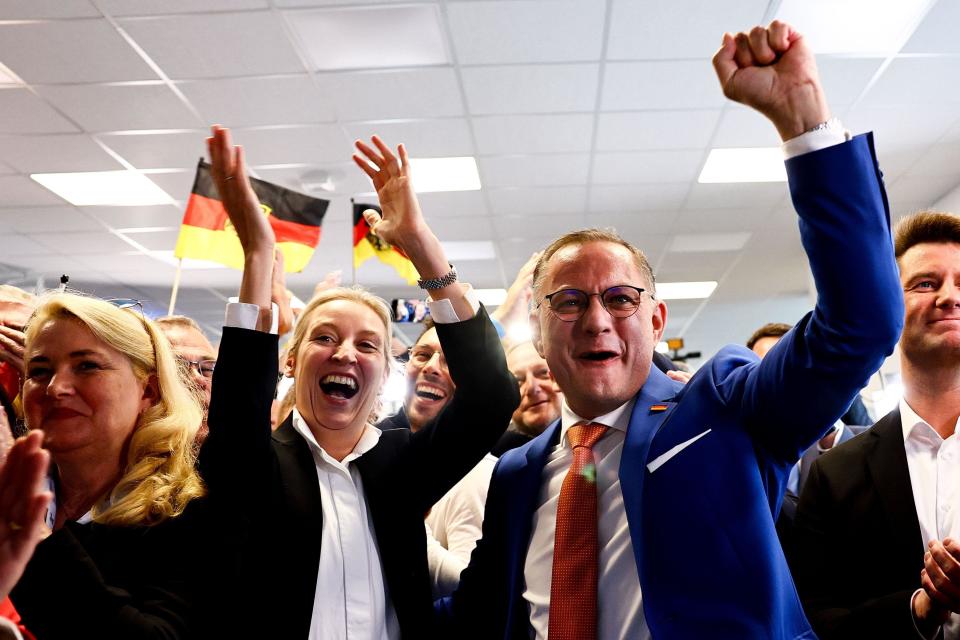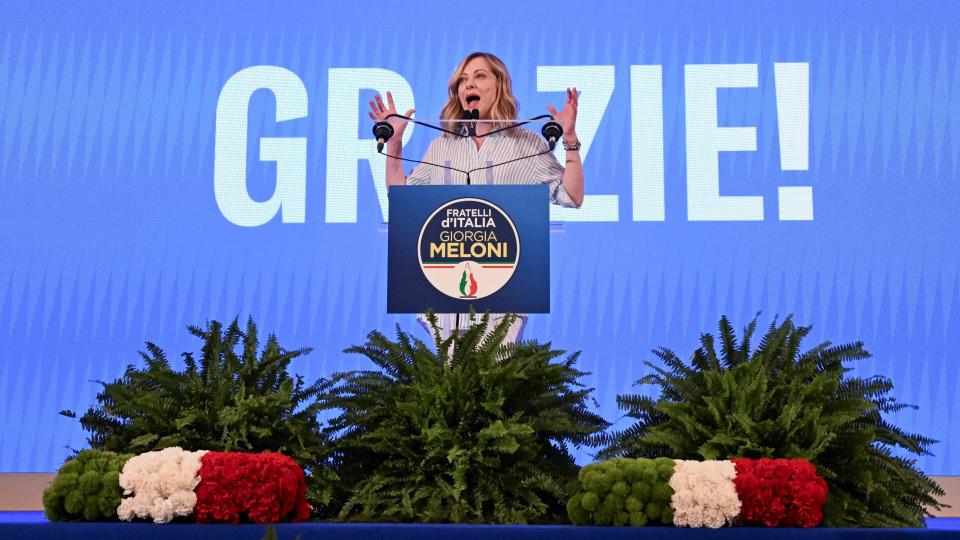Europe's night of election drama capped by Macron bombshell

France's Emmanuel Macron has called a bombshell snap election after being defeated by the far right in the European elections - in a night of drama that overall saw the centre right tighten their grip on the EU Parliament.
“I’ve decided to hand you back the choice of our parliamentary future with a vote,” Mr Macron declared to a stunned French population in a televised address. “I am therefore dissolving the National Assembly.”
Europe's far-right parties had expected a surge, and Austria's Freedom Party was already on course for a narrow, unprecedented win when France's National Rally delivered the biggest success.
National Rally, fronted by Marine Le Pen and Jordan Bardella, won more than 31% of the vote - more than double that of Mr Macron's centrist Renaissance.
But beyond France, the broader story of Europe's four-day vote marathon belonged to the parties of the centre right.
They strengthened their majority in the European Parliament, with victories in Germany, Greece, Poland and Spain, and significant advances in Hungary, against long-dominant Prime Minister Viktor Orban.
“The centre is holding, but it is also true that the extremes on the left and on the right have gained support,” said Ursula von der Leyen, the centre-right head of the European Commission, now on course for a second term.
There was also less success for the far right in the Netherlands, where anti-Islam populist Geert Wilders’ Freedom Party came second; and in Belgium where the separatist Vlaams Belang lost out to the nationalist New-Flemish Alliance.
Ms von der Leyen said her centre-right group was an "anchor of stability", but such a result required "great responsibility for the parties in the centre".
There had been talk before the vote that her dominant European People’s Party might consider talking to the two right-wing groups that house the far right.
But she made clear the EPP's only allies would be the Socialists & Democrats and the liberal Renew group that includes Mr Macron’s party.
While the centre right has a commanding 184 seats in the 720-seat European Parliament, the S&D has not lost ground, and the centrists are still third, despite a big drop in seats.
Germany’s opposition conservatives were always going to come out on top, and they scored an impressive 30% of the vote.
But for Chancellor Olaf Scholz’s SPD party this was the worst ever result in a European election, coming third behind the far-right Alternative for Germany (AfD).
A victorious head of the conservative CDU, Friedrich Merz, said it was a disaster for the three-party ruling coalition and he called for a change of tack: "They're damaging our country with the kind of politics they do."
The AfD has endured a slew of scandals involving espionage, foreign interference and allegations of Nazi sympathies, and yet its support still held up.
"After all the prophecies of doom, after the barrage of the last few weeks, we are the second strongest force. And I'm telling you, the only way is up," said co-leader Alice Weidel.


Meanwhile a new anti-migrant far-left party, BSW, led by charismatic left-wing firebrand Sahra Wagenknecht, also performed well – rounding off a good night for radical parties.
In Hungary, Peter Magyar, a former insider in Viktor Orban's government has proved a dangerous rival to his old ally, polling more than 30% barely two months after forming his centre-right Tisza party.
Mr Magyar told BBC Budapest correspondent Nick Thorpe that Hungarians had a new situation - "a new opposition party able to defeat this government at the next general election in Hungary."
In Spain, the centre-right opposition Popular Party (PP) defeated Prime Minister Pedro Sánchez’s Socialists, but not by the big margin that PP leader Alberto Núñez Feijóo had been hoping for.
he centre-right leader said it was a "resounding electoral triumph", but the Socialists finished on 20 seats, only two fewer than the PP.
Another far-right party, Vox, came a distant third.
Meanwhile, in Italy, Giorgia Meloni’s dominance of her country's politics continued.
Her far-right Brothers of Italy polled 29% of the vote, defeating the centre left Democratic Party of Elly Schlein by almost five points.
“Thank you to the Italians who are continuing to choose us… I am proud of the result tonight,” she told her supporters.

In just five years, Ms Meloni has more than doubled her party’s seats in the European Parliament, while Ms Schlein’s performance pleasantly surprised even party activists.
Belgium was holding national and regional elections as well as the European vote, and although the far right had been expected to top the vote, it was the New-Flemish Alliance that came first, bringing an end to the rule of liberal Prime Minister Alexander De Croo.
“The far right has underperformed in Belgium, the Czech Republic, Hungary, Finland and Poland. But it has overperformed in France,” said Prof Alberto Alemanno of HEC Paris, who was surprised that President Macron decided to dissolve parliament.
“It’s disproportionate that these election results might push a government out of a country,” he told the BBC.
Although there are only a handful of left-of-centre governments in office in the EU, there were victories for the Green-Labour alliance in the Netherlands, the Socialist opposition in Portugal and there was a surprise victory in Denmark for the opposition Green-Left party, which finished ahead of the ruling Social Democrats of Mette Frederiksen.
The Danish prime minister, recovering from a physical attack in Copenhagen on Friday, said while the right wing had made significant progress in Europe, "here in Denmark we stand out".
In Slovakia the ruling Smer party of Robert Fico had been expecting to win, after the prime minister survived an assassination attempt.
Smer has campaigned against the EU's policy of sending arms to Ukraine and its Green Deal plans to tackle climate change.
But it lost to the liberal opposition Progressive Slovakia party, whose chairman Michal Simecka said voters had sent Mr Fico's government a clear message, that it could not do whatever it wanted.
Young French leader's rise and Belgium's future existence: What to watch in EU elections
Europe’s centre left struggles to hold back surge from right


